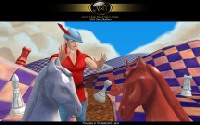| |
Site Navigation
Main
News
Forums
Games
Games Database
Top 100
Release List
Support Files
Features
Reviews
Previews
Interviews
Editorials
Diaries
Misc
Download
Gallery
Music
Screenshots
Videos
Miscellaneous
Staff Members
Privacy Statement
|
|
In his new weekly MMORPG.com column, Nathan Knaack takes a stroll down memory lane with a look back at the origins of the modern MMO.The Past: Dungeons and Dragons to Meridian 59 Ė Pencil and Paper to the Internet
Itís not difficult to trace the birth of the MMORPG back to its ancestors, but instead of diluting this essay with an array of links, Iíll go over it one more time. The great granddaddy of all RPGs is, of course, Dungeons and Dragons. Originally conceived as a tabletop medieval war game, not unlike what Warhammer is today, they (Gary Gygax and his partner, Dave Arneson) found that the game was much more enjoyable when they controlled individual characters instead of entire squads, battalions, and armies. It was more interesting to follow the battles and adventures of a single person, like the main character of a novel. Additionally, they discovered that battlefields werenít the only place that a hero could shine; taking a cue from Greek, Roman, Norse, Native American, African and Asian epics, the classical hero actually did most of his legendary work in dungeons, mountaintops, or throne rooms. Heroes didnít just conquer opposing armies and lead troops; they slew dragons, rescued damsels in distress, and challenged villains to duels. This is the birth of what we have come to know as the RPG character, which is the most essential, core piece of the role-playing game. To play a role, you must have a character. Iím not talking about having a strength score, a laundry list of weapons, and the words ďarmor classĒ jotted down somewhere on eraser-worn loose-leaf paper; thatís just math and logistics. A character is a personality, a set of mannerisms, and a moral code. Itís the rollercoaster of history, the voice you use to portray him or her, and all of the motivations that steer his or her decisions. Itís everything about the role youíre playing thatís not written down on paper.
Another important foundation that Dungeons and Dragons gave us was the perpetuation of the story, the revolutionary idea that the game doesnít end after you slay the villain, rescue the princess, and find the treasure. Next week, youíd be back in your friendís basement around the gaming table, battling the next villain or traveling to the next dungeon. Maybe you were searching for something, maybe something was chasing you, or maybe some adventure had found you somehow. With the story moving on from session to session, you began to accrue a lengthy portfolio of tales. This was one of the best parts about Dungeons and Dragons, for while a discussion about a movie was limited to what happened in that movie alone, a nostalgic conversation about a particular D&D character could span an entire lifetime of victories, defeats, mysteries, narrow escapes, and fantastic encounters. Just like millions of other D&D veterans, I could easily fill a few days just sitting back and sharing the exploits of a few of my favorite characters. In fact, there have been times where some of my regular groups has gathered to play a game, but instead spent an entire four or five hour session just telling (and in many cases, re-telling) stories of previous adventures. More... | | Source: MMORPG.com |
|
|





 Outside the Box - Editorial @ MMORPG.com
Outside the Box - Editorial @ MMORPG.com